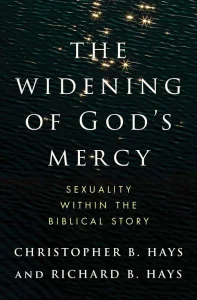Hang up your tweed jackets and lower your spectacles, people, something big just rattled all us scholarly types. Richard B. Hays has changed his mind on LGBTQ inclusion, and there are layers to this conversation.

Richard B. Hays and Christopher Hays
In 1996, Hays released Moral Vision of the New Testament and it quickly became a standard text for biblical scholars, theologians and ethicists alike. In the 16th chapter, Hays carefully works through the few relevant New Testament passages and concludes the witness of the New Testament is against homosexuality. His careful argumentation and generous posture toward LGBTQ individuals (by 1996 standards, at least) made the chapter a fan favorite among those who wanted to respectfully and biblically exclude LGBTQ people from public spaces (religious or political) for what they deemed sexual immorality.
More than 30 years later, that chapter of Moral Vision is apparently not Hays’ final word on LGBTQ inclusion. In The Widening of God’s Mercy: Sexuality Within the Biblical Story, out in September with Yale University Press, it seems Hays has finally changed his mind. And pardon me for misquoting Lizzo because of the sensibilities of my dear Baptist readers, but “It’s about darn time!”
Christopher B. Hays co-wrote the book with his father, Richard. In the blurb accompanying every preview, one reads: “The authors — a father and son — point out ongoing conversations within the Bible in which traditional rules, customs and theologies are rethought. … The book begins with the authors’ personal experiences of controversies over sexuality and closes with Richard Hays’ epilogue reflecting on his own change of heart and mind.”
“The book begins with the authors’ personal experiences of controversies over sexuality and closes with Richard Hays’ epilogue reflecting on his own change of heart and mind.”
Richard has long been a heavyweight in white biblical studies. He is respected and accomplished. He’s like the Matchbox Twenty of New Testament scholars. He put out a lot of material in the late 1990s and early 2000s. His contributions are recognizable and familiar. He’s had a couple of big hits and for white Gen Xers and Millennials, he’s comfortable.
Black scholars such as Angela Parker have found some of his contributions helpful but also have described blind spots when it comes to race and gender. In Parker’s book, If God Still Breathes, Why Can’t I: Black Lives Matter and Biblical Authority, she recounts Hays suggesting one of his classes was too advanced for her. Later, when she was admitted to one of his classes, Parker recalls she was “the only African American and only woman.”
 Hence, the fitting image of Matchbox Twenty. White folks are going to bob their heads to Hays’ scholarship much like they would to “Push” while our Black siblings find something else to fill their ears. Hays doesn’t necessarily “wanna push you around” but some of the people who read him have definitely used Moral Vision to “push around” and “push down” queer people and their allies.
Hence, the fitting image of Matchbox Twenty. White folks are going to bob their heads to Hays’ scholarship much like they would to “Push” while our Black siblings find something else to fill their ears. Hays doesn’t necessarily “wanna push you around” but some of the people who read him have definitely used Moral Vision to “push around” and “push down” queer people and their allies.
His respected status among white scholars is what made his chapter in Moral Vision so nefarious. When faced with movement in larger Christian culture toward inclusion, white evangelicals could whip out chapter 16 and say, “The guy all of you read in your seminaries agrees with us and has ended all debate on this issue.” There has been no revised edition of Moral Vision in which Hays recants, and so the chapter has remained a hefty cudgel in the non-affirming arsenal for years.
Here’s where the layers come in. Christopher B. Hays, the lead author of The Widening of God’s Mercy, is the D. Wilson Moore Professor of Old Testament and Ancient Near Eastern Studies at Fuller Theological Seminary. In 2015, Daniel Kirk (associate professor of New Testament at Fuller) was not considered for tenure because of his views surrounding the Bible and human sexuality. Kirk basically was pushed out of the institution for views similar to what one expects from Hays’ book.
“His respected status among white scholars is what made his chapter in Moral Vision so nefarious.”
How will the publication of the Hays’ book play in 2024? Far from a biblical studies nepo baby, Chris has certainly earned his place in the field. One wonders, though, if the clout his dad’s name carries will soften the institutional reaction. For his sake, I hope so. Chris has far more skin in the game as the lead author who is still in the workforce and at an evangelical institution. If the same book had come out in, say, 2010 with Richard as the lead author, I expect the senior scholar would have weathered the backlash much more easily than his son. That’s just the reality of the difference in their institutions (Duke vs. Fuller) and celebrity scholar status.
I cannot congratulate Richard Hays for finally getting to where we needed him to be long ago. Moral Vision’s homosexuality chapter has done untold harm these past 30 years, and such harm calls for the most explicit and contrite repentance one can muster. Maybe The Widening of God’s Mercy will provide such repentance. At the very least, I am glad, in September, we might have the tool we need to stop the damage chapter 16 of Moral Vision has done.
Rebecca Hewitt-Newson, pastor of Emmaus Way Church in Durham, N.C., mused on social media, “Why do you get to write the book about this? How about instead you just promote the work of queer theologians and biblical scholars who’ve been there for a long time.”
I agree. Feel free to read Hays and Hays in September, but more importantly, there are myriad queer voices you will want to engage. You can start with a list provided by Duke Divinity School’s Library. Or check out these examples:
- The Queer God, by Marcella Althaus-Reid
- Dancing Theology in Fetish Boots: Essays in Honour of Marcella Althaus-Reid, by Lisa Isherwood (editor)
- Bible Trouble: Queer Reading at the Boundaries of Biblical Scholarship, by Ken Stone and Teresa J. Hornsby (editors)
- Queer Commentary and the Hebrew Bible, by Ken Stone
In addition, anything by Cody J. Sanders, Susan Shaw or Lynn Huber are well worth your time.
I’ll end by quoting Natalie Webb, pastor of University Baptist Church in Austin, Texas. It is truly “never too late to change your mind! If Richard Hays … can change his mind and look back and see that he was wrong, it’s OK for you to, too. Come on along, there’s plenty of space and grace over here.”
Indeed there is. Thanks for joining us, Drs. Hays.

Anna Sieges
Anna Sieges serves as associate professor of religion at Gardner-Webb University in Boiling Springs, N.C. She loves shopping, discussing the Bible and romantic comedies. The opinions expressed here are her own.
Related articles:
What not to do if there are queer folks in your church (and there are) | Opinion by Anna Sieges
My quest to find the word ‘homosexual’ in the Bible | Opinion by Ed Oxford
My journey toward LGBTQ inclusion: God still speaks | Opinion by Chris Conley
10 things we’re learning about the LGBTQ debate in the church | Opinion by Mark Wingfield


